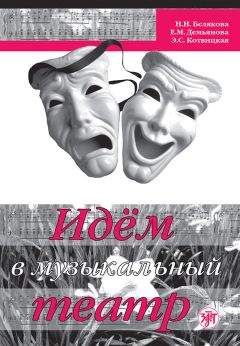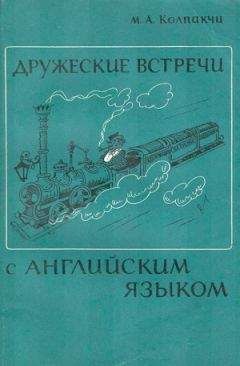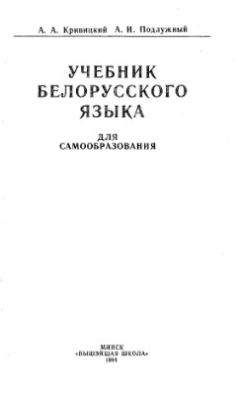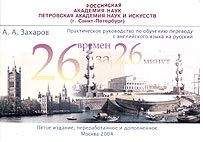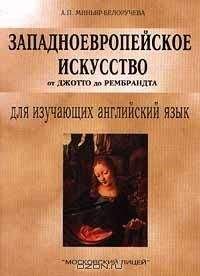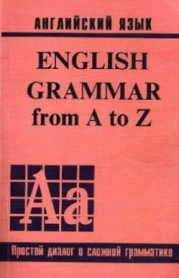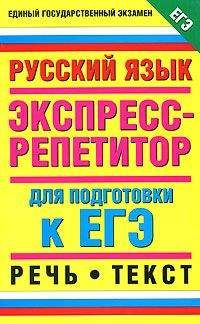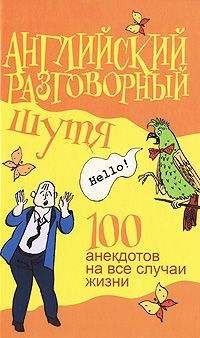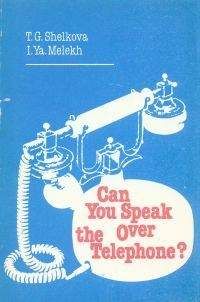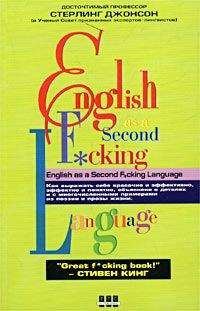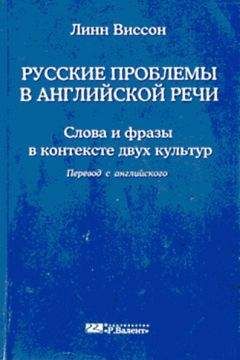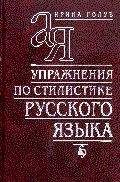Т. Шелкова - Can You Speak Over the Telephone. Как вести беседу по телефону
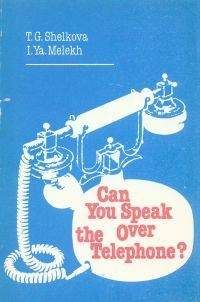
Скачивание начинается... Если скачивание не началось автоматически, пожалуйста нажмите на эту ссылку.
Жалоба
Напишите нам, и мы в срочном порядке примем меры.
Описание книги "Can You Speak Over the Telephone. Как вести беседу по телефону"
Описание и краткое содержание "Can You Speak Over the Telephone. Как вести беседу по телефону" читать бесплатно онлайн.
Ведение разговора по телефону на иностранном языке требует от обучающегося определенных навыков понимания, восприятия и удержания в памяти услышанного, а также незамедлительной словесной реакции на услышанное. Недостаточное развитие этих навыков является препятствием к тому, чтобы хорошо и уверенно говорить по телефону.
Пособие ставит своей целью помочь учащимся овладеть навыками беседы по телефону, пользоваться общепринятой терминологией.
Во второе издание (1-е — 1980 г.) внесены исправления редакционного характера.
Для лиц, самостоятельно совершенствующих свои знания английского языка.
Mr Weston: This time I’m here only on a short visit and I’d like very much to meet you. Could you join me for lunch, say, tomorrow?
Mr Serov: Thanks for your kind invitation but I’m afraid I’m booked up for tomorrow. Could you suggest an alternative date?
Mr Weston: Just a second. I’ll look at my schedule. Can we make it Friday, then?
Mr Serov: Yes, that’d be splendid.
Mr Weston: I’ll be in touch with you and let you know the place and time.
Mr Serov: Thank you for the invitation. Good-bye.
Mr Weston: See you on Friday.
3. Invitation to a Motor Show
Secretary: Hello.
Mr Stock: Good morning. I’d like to speak to Mr Baturin.
Secretary: Who’s calling, please?
Mr Stock: This is Mr Stock from Satre Ltd.
Secretary: Will you hold the line, please? I’ll see if Mr Baturin’s available. Mr Stock, Mr Baturin is on the other phone. Will you wait or call back?
Mr Stock: I’ll wait, thank you.
Secretary: Hello, Mr Stock. I’m sorry to have kept you waiting. I’m putting Mr Baturin on the line now.
Mr Baturin: Good morning, Mr Stock.
Mr Stock: Good morning, Mr Baturin. I believe you know that the International Motor Show at Earls Court is due to open on Wednesday, October 18. We would greatly appreciate it if you could come to Earls Court to attend the official opening. The Lada 1200 Saloon from Satre Motors will make its debut at this show.
Mr Baturin: Thank you very much for your kind invitation. But unfortunately I can’t accept it. I have an appointment. I think Mr Ozerov will be able to attend this function if you don’t mind.
Mr Stock: Oh, we will be happy to see Mr Ozerov. We are sending a Complimentary Ticket[2] for him by hand.
Mr Baturin: I wish you every success in your business. The Lada is really creating a great deal of interest wherever it is shown. I sincerely hope that selling Soviet cars in this country will be very profitable for you.
Mr Stock: Thank you for your kind wishes. Good-bye.
Mr Baturin: Bye-bye, Mr Stock.
4. Invitation to the Ballet
Mr Hopkins: Hopkins speaking. Good afternoon.
Mr Zotov: Good afternoon. Zotov here. I’m so glad I got through at last. I tried to get you on the phone yesterday but you were out.
Mr Hopkins: Yes, I was away from London and returned this morning.
Mr Zotov: I know you are a ballet admirer. I’d like to invite you to Covent Garden. I guess you know the Bolshoi ballet is now in London and tomorrow they are performing “Spartacus”.
Mr Hopkins: Thank you very much. It’s very kind of you. I’ll gladly accept your invitation to see the fabulous Bolshoi ballet which commands the love and admiration of audiences all over the world.
Mr Zotov: Good. Incidentally the performance starts at 7.30 and runs three hours. Would you like me to call for you?
Mr Hopkins: No, thank you. Don’t bother. I’ll get there on my own.
Mr Zotov: Then I’ll be waiting for you at 7.15 outside the theatre. Goodbye.
Mr Hopkins: Thanks a lot. Good-bye.
5. Declining an Invitation
Mr Smirnov: Hello.
Mr Barlow: Hello. I’d like to speak to Mr Smirnov.
Mr Smirnov: Speaking.
Mr Barlow: Barlow here. Good morning, Mr Smirnov.
Mr Smirnov: Could you speak up, please. Your voice is ever so faint.
Mr Barlow: Hold on a minute, please. I’ll try to fix the microphone. Are you there, Mr Smirnov?
Mr Smirnov: Oh, yes. I think that’s better now.
Mr Barlow: Mr Smirnov, I’m calling to invite you to dinner tomorrow.
Mr Smirnov: Thanks a lot. It’s very kind of you and I’d be happy to join you but I’m afraid I’ve got another engagement for tomorrow. I’m very sorry.
Mr Barlow: I’m sorry too, but I do understand I should have invited you a few days ago. One can’t really expect people to accept invitations at such short notice, of course. We’ll have to make it some other time then. Good-bye.
Mr Smirnov: Good-bye, Mr Barlow.
EXERCISES
I. Read these dialogues and pay attention to telephone phrases.
II. Reproduce these dialogues as close to the text as possible.
III. Practise spelling different names over the phone.
IV. What would you say on the phone in reply to these remarks?
1. Hold on, please. I’ll see if Mr Morris is available. 2. How have you been? 3. I wonder if you and your colleagues will join us for lunch on Friday. 4. I’m calling to invite you to Covent Garden. They are performing “Othello” tomorrow. 5. Would you like me to call for you? 6. I’m afraid I will not be able to attend the Annual Meeting which you will hold on Monday. I’m so sorry, really. 7. If you’re ever in London we’d love to see you. 8. Why don’t you come round and have dinner with us next Thursday? 9. Do let’s meet sometime. 10. I wish I could, but I’ve promised to go with my children to the cinema. 11. Would you care for a game of tennis on Saturday morning? 12. Thanks awfully, but I’m afraid I’m booked up for tomorrow.
V. In what situations would you say the following?
1. Yes, I’d be delighted to accept your invitation. 2. You’ll have a chance to meet the rest of my colleagues. 3. Thanks awfully, but I’m afraid I’ve got a lunch appointment for this time. 4. Yes, that’d be splendid. I’d love to. 5. I’m terribly sorry. I’m booked up for Friday. 6. Good, see you on Sunday, then. 7. I’ve been wanting to meet you for a long time. 8. When exactly do you suggest I come? 9. It’s nice meeting you. 10. I’m so pleased to have met you. 11. I’ll get there on my own. 12. I’ll call back later. 13. Could I leave a message? 14. I understand we should have invited you a few days ago. 15. Will you speak up, please. 16. Your invitation came at very short notice. 17. Sorry. I’m engaged. 18. That suits me perfectly. 19. It is a credit card call.
VI. a) Extend an invitation by phone:
1. to a reception; 2. to the Bolshoi Theatre; 3. to an International Book Exhibition; 4. to a luncheon; 5. to your place; 6. to a cocktail party
b) Accept or decline the invitation by phone.
Read the dialogues aloud working in groups of two.
Dialogue 1
6. Entertaining Guests
Mr Block: They say that entertaining guests is an essential part of diplomatic activity. Do you share this opinion?
Mr Bulatov: I would rather consider entertaining not an essential but a most important part of diplomatic work. Apart from improving the public image of the country you represent it helps to establish contacts and make friends.
Mr Block: It takes a lot of time and efforts to say nothing of money to arrange a diplomatic reception such as an official dinner, for instance.
Mr Bulatov: Yes, it does. But the most difficult job is to make the people you have invited feel comfortable and at ease.
Mr Block: I suppose it depends on the host.
Mr Bulatov: And the hostess, the way she works out the seating plan and observes the order of precedence. Ministry officials and foreign diplomats are touchy people, you know.
Mr Block: Should the common interests and the profession of the invited guests be taken into consideration while arranging the seating plan?
Mr Bulatov: If you want your dinner to proceed smoothly you ensure it as tar as possible. The conversation among the guests will be more lively, and most probably there will be no conflicting situations.
Mr Block: Conversation is an art.
Mr Bulatov: You are right. A conversation is not an interchange of words, but ideas. Even a dinner conversation should be thoughtful, natural and still light. It is an art which is acquired by experience.
Mr Block: Some topics are in themselves unpleasant or are sure to bring out from some guests dissatisfaction or even anger.
Mr Bulatov: I don’t think that there are taboo subjects the discussion of which should be avoided.
Mr Block: Are there any topics which you wouldn’t recommend to touch upon during an official dinner?
Mr Bulatov: If there are guests whom you don’t know well enough, avoid to talk on local or national politics, religion, death and other tragedies.
Mr Block: Some people are interested in local scandals, gossip and divorces.
Mr Bulatov: Exclude them. There are some topics which interest almost everyone and are fairly sure to go well in any company. These are books, the theatre and motion pictures, radio and TV programmes, travel-places visited, scientific achievements and so on.
Mr Block: In other words the worth of the topic depends on the time, the place, and the people you are talking to.
Mr Bulatov: You are right, Mr Block.
Dialogue 2 (Telephone Conversation) Invitation to a Reception
Operator: Foreign Office. Good afternoon. Can I help you?
Mr Klochek: I’d like to speak to Mr Drake, please.
Operator: Who’s calling, please?
Mr Klochek: Mr Klochek of the Polish Embassy.
Operator: Wait a minute, please. (Pause.) You are through now, Mr Klochek.
Mr Drake: This is Drake speaking.
Mr Klochek: Good afternoon, Mr Drake. Klochek calling.
Mr Drake: Good afternoon, Mr Klochek. How have you been all this time?
Mr Klochek: Very well, thank you. And you?
Mr Drake: Fine, thank you. Since my return from Egypt I have been eager to see you.
Mr Klochek: You will have a chance. I’m calling to invite you and your wife to the reception to be held in our Embassy on Friday, March 27, at 6 p.m.
Mr Drake: What is the occasion?
Mr Klochek: A group of actors from the National Theatre arriving for the performance in this country.
Mr Drake: You mean from the Warsaw Theatre of opera and ballet?
Mr Klochek: Exactly.
Mr Drake: Wonderful. My wife will be delighted.
Mr Klochek: I’ll get the invitation card in the mail early morning tomorrow. We are looking forward to seeing you and your wife. Good-bye.
Mr Drake: Thank you very much, Mr Klochek. Good-bye.
Dialogue 3 (Telephone Conversation) Invitation to a Dinner
Mr Hunter: Good evening, Mr Won Diem.
Mr Won Diem: Good evening, Mr Hunter. It’s ages I heard from you.
Mr Hunter: I’ve been away for a while. It was a business trip to Thailand.
Mr Won Diem: I’m glad you phoned me.
Mr Hunter: The days have been so crowded since my return that there have been few occasions to visit any of my friends.
Mr Won Diem: I hope to see you some day.
Mr Hunter: That is what I mean. Will it be possible for you and Mrs Won Diem to have dinner with us at seven o’clock on Friday, the tenth?
Mr Won Diem: Even if we had other plans for Friday, we should try to cancel them to have the pleasure to see both of you.
Mr Hunter: So this coming Friday, at seven. We are expecting some other interesting people to come.
Mr Won Diem: Thank you, Mr Hunter.
Mr Hunter: Good-bye, Mr Won Diem.
Mr Won Diem: Good-bye, Mr Hunter. See you on Friday.
WORDS AND WORD COMBINATIONS YOU MAY NEED
1. an essential part существенная связь
to share opinions делиться мнениями
to make friends заводить друзей
to say nothing (of) не говоря уже
touchy people обидчивые люди
lively conversation оживленный разговор
an interchange of words обмен словами
gossip n сплетня
to touch upon a subject касаться предмета
divorce развод
2. to be eager сильно желать чего-л.
to hold a reception устраивать прием
to be delighted быть очень довольным
to look forward (to) ожидать с нетерпением
3. to be crowded зд. быть наполненным
few occasions редкие случаи
Подписывайтесь на наши страницы в социальных сетях.
Будьте в курсе последних книжных новинок, комментируйте, обсуждайте. Мы ждём Вас!
Похожие книги на "Can You Speak Over the Telephone. Как вести беседу по телефону"
Книги похожие на "Can You Speak Over the Telephone. Как вести беседу по телефону" читать онлайн или скачать бесплатно полные версии.
Мы рекомендуем Вам зарегистрироваться либо войти на сайт под своим именем.
Отзывы о "Т. Шелкова - Can You Speak Over the Telephone. Как вести беседу по телефону"
Отзывы читателей о книге "Can You Speak Over the Telephone. Как вести беседу по телефону", комментарии и мнения людей о произведении.





